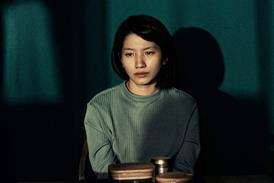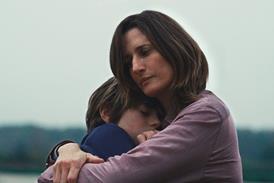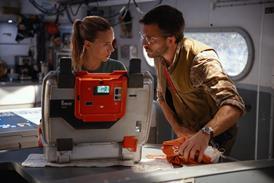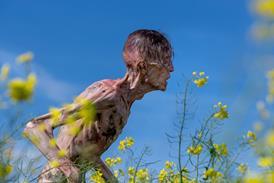An introverted Catholic girl’s sexual awakening is the focus of Urska Djukic’s debut
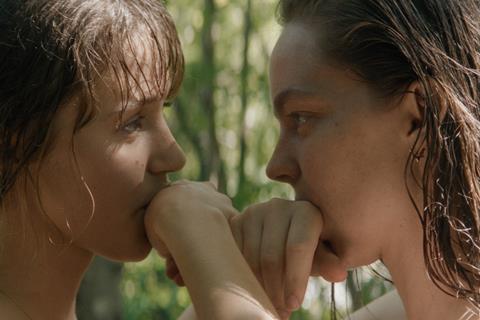
Dir. Urska Djukic. Slovenia/Italy/Croatia/Serbia. 2025. 90mins
The intersection between Catholicism and overheated adolescent hormones has long been a rich source of inspiration for filmmakers. But with her terrific feature debut, Slovenian director Urska Djukic digs deep into this fertile terrain and finds something fresh. Gauche and naïve 16-year-old Lucija (Jara Sofija Ostan) joins a Catholic high school choir and is unsettled by discoveries about herself and the dynamics between the other girls. Djukic’s coming of age drama is heady with intertwined sensual and religious symbolism; the first rate score and sound design teases out the tangled, conflicting impulses towards Catholic devotion and erotic abandon.
Striking staging and evocative visual poetry
Ljubljana-born Djukic has achieved notable success with several shorts, including the European Film Award- and Cesar Award-winning Granny’s Sexual Life (2021), and the striking staging and evocative visual poetry of her feature debut secured the picture a works in progress post-production award from Les Arcs in 2023. Little Trouble Girls (which takes its title from a Sonic Youth track that plays out at the film’s close) should enjoy a healthy festival run following its premiere in Berlin’s Perspectives strand. And the marketable combination of teenage schoolgirl misadventures and lovely choral Slovenian folk music should catch the eyes (and ears) of arthouse distributors looking for promising new female directing voices.
Lucija is an introverted, withdrawn girl who is prone to drifting off into daydreams – something that Djukic deftly demonstrates at the film’s opening, with a collage of sounds and extreme close ups of the distractions that claim Lucija’s attention. Key among these distractions are the vividly painted lips of Ana-Marija (Mina Svajger), a confident, popular senior who, like Lucija, sings Alto. One of several new girls in the choir, Lucija finds herself standing between Ana-Marija and her friend Klara (Stasa Popovic) and is caught up in the slipstream of their racy gossip and scandalous confidences.
When the choir travels to a convent in Cividale del Friuli, in northern Italy, for several days of intensive rehearsals, sheltered Lucija is flung into candid discussions of periods, sexual exploits and kissing. To add to the churning mass of unfamiliar emotions, there are workmen currently renovating the convent and Lucija, who can spend long minutes gazing at just an olive tree, finds that her attention is drawn to one of the men in particular. But Lucija’s attraction to the man causes tension within her newly-formed social circle, and she finds herself painfully ostracised.
Djukic punctuates the film with images of ripeness and fecundity: a shot of Ana-Marija’s belly-button cuts to a shot of a bee circling a plump flower; wild woodlands and water offer secret places for self-discovery. To atone for sins, the girls force themselves to eat bitter unripe grapes as a penance; later, having finally reached a degree of acceptance about her urges, Lucija absent-mindedly gorges on glossy, sweet grapes bought at a market stall.
There are points, perhaps, when the symbolism gets in the way of the storytelling clarity. A phenomenal scene in which the extremely uptight choirmaster (Sasa Tabakovic) targets Lucija, systematically dismantling her confidence and pushing her to breaking point, is followed by a series of fantastical images: a candle-lit cave, a choir of robed nuns, Lucija, in Vestal white, floating in the river. At first it seems as though she might have opted to end it all by chucking herself off Cividale’s Devil’s Bridge. But in fact, as spelled out in the lyrics of the closing song, Lucija has finally made peace with both her faith and her sins.
Production company: SPOK Films
International sales: Heretic info@heretic.gr
Producer: Jozko Rutar
Screenplay: Urska Djukic, Maria Bohr
Cinematography: Lev Predan Kowarski
Editing: Vlado Gojun
Production design: Vasja Kokelj
Music: Lojze Krajncan
Main cast: Jara Sofija Ostan, Mina Svajger, Sasa Tabakovic, Natasa Burger, Lotos Vincenc Sparovec, Spela Frlic, Matia Casson, Sasa Pavcek, Stasa Popovic, Mateja Strle, Irena Tomazin, Branko Zavrsan






